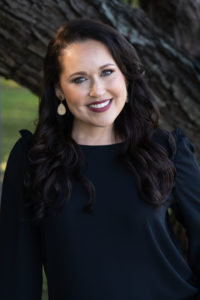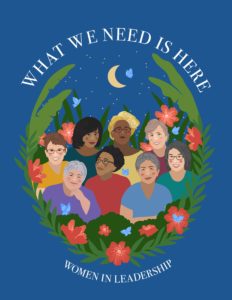 Maribel Ramírez Hinojosa is a clinical psychologist in Texas. She attends Hope for the Broken, a Mennonite Church and is a steering committee member for MC USA’s Women In Leadership. In her free time, she enjoys spending time with her husband and two children.
Maribel Ramírez Hinojosa is a clinical psychologist in Texas. She attends Hope for the Broken, a Mennonite Church and is a steering committee member for MC USA’s Women In Leadership. In her free time, she enjoys spending time with her husband and two children.
__________________
My first name is María, but ever since I can remember, people have called me by my middle name, Maribel. That people called me by my middle name was something that my mother insisted on for reasons that are entirely understandable.
You see, I was born in México, and when my then Catholic parents took me to church to get baptized, they introduced me to the priest as “Maribel.” The priest, much to my parent’s surprise, was troubled that my name was not “María.” In fact, the priest was more than troubled and refused to baptize me unless my parents made “María” my first name and “Maribel” my middle name.
My parents were shocked. But my mother was especially upset. After all, “Maribel” already had the name “María” in it; it is a joining of María and Isabel. But in those days, it felt as if the authority of the priest was final. My mother, frustrated of course, believed she did not have a choice.
My family is from a rural part in northern México, and we lived an hour and a half away from the closest town, so my parents had limited options in terms of where they could baptize their daughter. Reality set in for my mother. If I was to get baptized, my parents would be forced to name me María. Maribel would get pushed to middle name status.
Looking back now, I can certainly sympathize with my parents, and as a mother myself, I understand my own mother’s frustration.
Here was this male religious leader who had imposed his authority over a family who he knew he could manipulate.
Nowhere in scripture is it mandated that Mexican families name their daughters María and their sons José. Yet, travel anywhere in México, Latin America, and Latino USA, and you will run into your share of Marías and Josés. These naming practices have been a Catholic tradition for so long that in some places it’s taken as just something that people do as an offering to God, perhaps.
My mother has a couple of sisters whose first names are María, and my dad and his brother’s first names are José. Maybe my grandparents didn’t mind naming their children like that, and that is okay, but my mother did not have a choice in the matter. For her, it felt more like coercion, and that’s why, to this day, both my parents refuse to call me María. Perhaps it’s their way of undermining the priest’s authority and pushing back against his obvious abuse of power.
I’ll never forget the day, shortly after having arrived in the United States, that I went with my mother to apply for a social security card. We were in a new country, far from home, and here was my mother demanding that my middle name appear on my social security card. The way my mother understood it, when I grew up and applied for a job, people were going to call me by the name that appears on that card. And she wanted it to be clear that people should call me by the name that she and my dad wanted for me, Maribel.
And you better believe that every year when I registered for school, or met my new teacher for the year, she would make it crystal clear that they were to call me by my middle name. That was my mom’s way of rebelling against what was imposed on her, and I love her for that.
I’ve always known the contested story around my name and why everyone called me Maribel. But to be honest, I never thought much about it until the summer of 1996, when I was twenty years old. That summer, I participated in an anti-racism drama troupe, sponsored and organized by Mennonite Central Committee. I and six other participants (African American and Latino) traveled the west coast to perform dramas on our experiences with racism. We spent a long time on the road, going from one place to another.
One day, as I sat in the backseat of one of the cars we rode in, I started drawing with my finger on the back of the front seat. I would draw something and then erase it. I then started to write my name, María, because Maribel was too long and my then friend, now husband, Felipe, asked me who María was. I told him that that was my first name and from that day forward he started calling me María.
It didn’t bother me at all until, a couple of years later, when we started dating and he visited my home and met my parents. On one occasion, he was having lunch at our house and he called me “María” in front of my mom. I think you know what happened next. My mom, ever the cool and collected one, did not say anything in that moment, but after Felipe left, she pulled me aside and told me to tell Felipe to never call me “María” again. It was a reminder of how close my mother carried that wound, and it made me sad.
I don’t think it had registered with me how strongly my mother had felt about what people called me. I immediately told Felipe, but by that point he had been calling me María for so long and the habit was hard to break. He still, occasionally, calls me María, although not as often.
Baptism is a sacrament that my parents believed their children needed to partake in to be able to go to heaven, and my name was the price they had to pay to get me there.
Religious leaders can sometimes abuse their power and often are not aware of the implications their words carry or how “made up” mandates can impact an entire family.
My mother did what she needed to do to get her daughter baptized and made sure nobody called her daughter the name that was imposed on her. I get that now. My angst and frustration are, of course, with that priest in México.
But here’s the complicated thing with me and my first name, I actually love the name “María,” even with its complicated story and all. Maybe I like it so much because I enjoyed memorizing my many familial last names and when I said the eight last names I had memorized, I would always preface it with my first and middle name: María Maribel.
Maybe the love for María has to do with feeling a connection to my country of origin since there are so many Marías in México. In fact, so many that there is even a written abbreviation (Ma.) to an already short name, since most people use it along with their middle name.
Maybe I have a strong affinity to the name María because my husband was the first one who called me that.
Whatever the reason might be, while I will never call myself by my first name, out of respect for my mother, I love hearing the sound of “María” when spoken and I love being part of a María tradition.

MC USA’s Women in Leadership (WIL) works to dismantle patriarchal systems in Mennonite Church USA by empowering women to live out the call of God on their lives, increase their capacities, and contribute their wisdom in congregations, area conferences, agencies and institutions.

